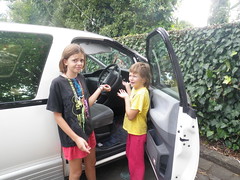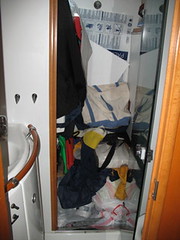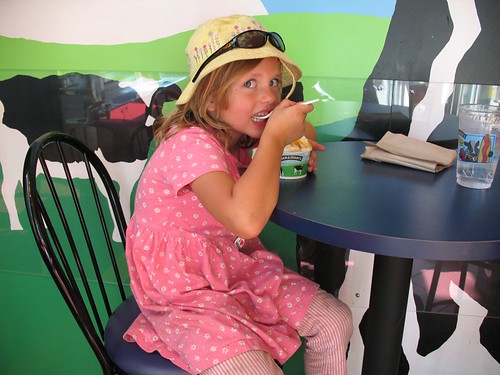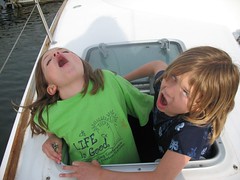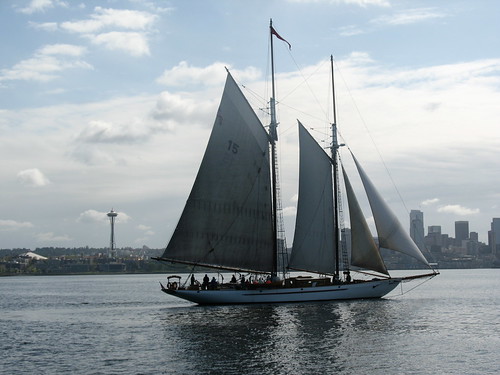Wednesday, March 24, 2010
Step 2 - Buy a Car
New Zealanders in general and Aucklanders in particular like to drive. Everything is very West Coast U.S.-ish with suburban sprawl, geographic water and mountain challenges, and very few, low quality and expensive public transit options. Folks have repeatedly told us that you can't live in Auckland without a car. Even our short time here supports this conclusion. While pavements (which is what they call sidewalks…no I don't understand it either…) are abundant, drivers are oblivious to pedestrians and downright hostile to cyclists. There are almost no dedicated bike and pedestrian corridors. With the widespread enthusiasm for the outdoors and sport, it is inevitable that this attitude while shift over time, but today it really sucks to be non-motorized in New Zealand.
So into our microdot of a minivan we wedge ourselves.
Of course, then we run into the most obvious delta between our world and mirror world: right-hand drive. Driving on the wrong side of the road is tricky and confusing. DrC took to it immediately, of course. Remember, this is the man whose surgical environment is both backwards and bent. He drives in reverse by looking in the rear view mirror and stepping hard on the gas petal. And he does it really really well. So after a day or so, the good doc mastered mirror world. It's taking me longer.
Actually, it's not driving that give me fits. I can do that. Just think LEFT LEFT LEFT LEFT. That works. There are occasional moments of disorientation when I'm making wide right turns, and I still find parking strange. However, the real problem is the subtle influence our driving patterns have on the rest of our movements through the world. Yesterday, I almost slammed into a runner at the park. It was early in the morning with the sun only thinking about rising. There was almost no lighting under the trees, and I could just barely make out the trail. Head phones on, head down, I'm slogging out a couple of laps in an earnest attempt to keep off the nearly two stone (20 pounds?) I lost on the boat. Suddenly I hear a muffled shout and sense movement directly in front of me. Primed for a mugger, I leap to the side ready to chop and kick only to find an irate business man in togs, muftie, and trainers (shorts, t-shirt, and running shoes) glaring and gesticulating as he continued on the path. Silly me. I was on the right side of the track. Or the wrong side. Or some side where I didn't belong.
Next time you are running on a trail, walking up a busy staircase, or pushing your trolley (shopping cart) down an aisle, pause for a moment to reflect on your position relative to those around you. More often than not, you'll find yourself automatically 'driving yourself' on the same side of the road as your native country's car. Even going in and out of doors at the broker, I find myself opening the wrong door and banging my nose on the glass. How many things are like that in our lives? We take for granted these patterns that are so ingrained we don't have rules about them. Why would you? You don't need a rule to tell you which side of the staircase to walk up. And then when we go to a new country, we're forced to reexamine these patterns, change existing ones and develop new ones, or face the consequences.
It's only taken us two weeks to stop putting our toilet tissue in the bathroom rubbish bin (trash can). I am certain the hotel housecleaning staff is grateful we're adapting.
Thursday, February 28, 2008
What? Again!?
We've been here before. Most of you remember the Drizzle December 2007 purge during which we sorted everything in the basement into three piles: junk, move to boat, and put into storage. Going back in time, those of my long standing readers might remember the Agonizing April Move during which we ceded our house of many years to renters, and compressed ourselves into the aforementioned basement.
Actually, if you travel back into time, we add layers of stuff in a sort of reverse archaeological dig. Each wave of stuff-evisceration disgorged van loads of toys, appliances, clothes and books. Each time involved several trips to the dump, a full year's tax deduction allowance to Goodwill, and a flurry of freecycling. We purged in November 2006 because I was bored. We did it back in Fall of 2005 because we'd just bought the boat and it seemed like the thing to do. Then there is the mother of all purges following our memorable trip to Whidbey during which we decided we didn't like being rich and normal and would rather be poor and insane.
And each time, we felt like we had stripped ourselves down to the bare essentials. I raise my hand here and swear to all that is holy that I believed each and every time I had gotten rid of everything. All that was left was the absolute minimum required for comfort and happiness. Yet each successive spasm of reductionism was a new lesson in minimalism. Each time we managed to get rid of more... more!... MORE!! That seems so counterintuitive. How can a family who is trying to do more with less get rid of more? Because there is always more to get rid of even when you stop buying.
I present this as a cautionary tale to those who are considering any form of simplification. Whether you simply seek to organize your closet, undertake a GTD transformation, or you are attempting to wedge yourself on to a boat, my recommendation is to give yourself time. Your ability to reduce your perception of what you need is a gradual process. Each time you lighten your material load, you need to give yourself a few months to adjust. Then do it again. And again. And yet again.
It is not that this process gets easier. In fact, it is challenging each and every time. When you purge, you are truly vomiting up the detritus accumulated over a lifetime. Our relationship with our things is so tightly entwined with our sense of self and self worth that each time involves many hard decisions about priorities, needs, and wants. Moreover, it's a dirty, thankless job that uses muscles you'd forgotten existed and leaves you with broken nails, a short temper, and the desire to smack your spouse.
Yet, during the fifth wave, you will find that items you thought critical to your very existence as a human being during the first purge are now dross in the tidal wave of life, just so much crap filling the forward lockers and sinking the boat. What would have been impossible to dispense with a mere two years ago is now garbage. Absolute garbage. You question whether it's even worth taking to Salvation Army.
I realize that we may have reached something approaching the pinnacle of purging with our most recent efforts. The entire family is more methodical this time. We are, after all, experts at the process now. The girls are dumping roughly the fuel load for a small star in toys, pillows and stuffed animals. DrC actually sorted his tool chests, consolidated into one, and reduced the total weight of his equipment to something less than a compact car but greater than a full water tank. I offloaded books and computer equipment. I can't for the life of me figure out why I thought I'd need four laptops and a box of romance novels.
One satisfying byproduct of purging when you live on a boat is that you get immediate, visual gratification and confirmation of your efforts. We saw two inches of Don Quixote's beautiful sky blue water line this afternoon for the first time since December.
We must be just about ready to go.
Wednesday, September 26, 2007
It Tastes Like Boat
I haven't finished my first cup of coffee. “Eat your breakfast.”
“I can't!” she avers firmly.
It's cold. We're running late. “You can.”
“Can't!” declares Aeron.
It's not wise to engage in verbal fisticuffs with a technical writer. Inevitably, we'll trump you.“MUST.”
“It tastes like boat!” she wails.
However, even a technical writer succumbs in the face of hard, cold facts. The instant oatmeal does taste like boat, which means it tastes roughly the same as sweetened fuel rags dipped in day old dishwater and used to wipe mold off the back of a refrigerator.
Oatmeal, crackers, cereal, flour, cookies... all serve the combined function of deodorizer and dehumidifier on our boat. They suck the manky boat smell and humid exhalations of five human beings and bind them in a carbohydrate matrix that would do proud an environmental engineer working on reducing total global carbon load. Forget Dry-Z-Air, Stickups and aromatherapy candles. All it takes to get rid of the smell on the boat is to buy a package of Mother's Chocolate Chip Cookies.
Of course, our food sacrifices its most important property – edibility – on the altar of rendering the boat more livable. If your crackers taste like boat, it seriously detracts from the wine and cheese experience. And instant oatmeal is just nasty anyway. I shouldn't buy the stuff. I wouldn't buy the stuff if the kids didn't insist and my mother hadn't spent most of my younger years imprinting me on Quaker Instant Oatmeal with Apples and Cinnamon. But Quaker Instant Oatmeal with Maple, Brown Sugar, and Diesel is simply gawdawful. I broke down and whisked us all off to Starbucks.
Unfortunately, there is no Starbucks in the middle of the Pacific. Or maybe there is. What do you bet there is a Starbuck's on Easter Island? But I digress. Living on a boat requires some ingenuity to seal your fresh dry goods away from the odoriferous bouquet that is your home. I think you need to divide your hermetically sealed solutions into three broad categories: Short Term, Long Term, and Very Long Term.
Short Term – Start with the basic question of how long is the short term? I define short term as the duration it takes to turn a box of Ritz Crackers from crispy goodness to soggy sea gull food. So let's say 15 minutes. In the short term, your solutions need to meet the following criteria: cheap, capable of taking an entire package of Oreo's, and easily stowable in accessible lockers. It must be cheap because you need a bazillion of these things for every dry good you bring on to the boat: rice, pasta, flour, cereal, crackers, sugar, spices. If it doesn't hold the entire package of cookies, you will eat what you don't stow – right there on the dock in front of God and everybody. Finally, if you can't get your hands on it without rearranging the deck chairs, you won't eat it in the short term. Actually, you will probably forget you even bought it.
For the short term, our boat uses Ikea plastic sealable boxes. We would use Tupperware or Rubbermaid, but those companies have decided to price their products somewhere north of Caphelon but not quite as high as Waterford crystal. Ikea prides itself on producing goods in every conceivable size and shape which works well for the storage issue. The seal isn't perfect, but it's good enough to last a week or so, and we find the Swedish look goes well with our curvy French boat.
Long Term – In the long term, we're all dead. Unfortunately, most of our human byproducts such as plastic bags, toxic waste sites, and Twinkies are not. On the boat, I stuff into long term storage under the salon cushions things that either: (1) I can't find them easily in the grocery stores near the shoreline (e.g. wasabi powder, sea salt, and buckwheat flower); or (2) I need to buy in large, bulky quantities to make myself feel like a Real Woman. Frankly, all our long term storage needs are a direct result of an impulse buy at Costco: a metric butt load of graham crackers, 20 pounds of unbleached wheat flour, or a year’s supply of Frosted Mini-Wheats. I find it ironic that while these products often ship in plastic bags, the bags are permeable to boat stench.
For these items, I bought a FoodSaver vacuum sealer. There's something weird about the FoodSaver plastic with the bumps which enables the vacuum process to work. The cost renders it roughly the equivalent of applying gold leaf to your food. However, we've discovered that you can buy 4mm painting tarp at Home Depot, cut it into the appropriate sizes and shapes, and then just use a 1” x 4” strip of the FoodSaver bumpy stuff at the opening to seal the package. That small strip renders the whole vacuum process possible.
The FoodSaver is also a pretty good way to seal spare parts against the marine environment, compress yarn into microscopic flat packages, and package extra meat and fish for longer freshness in the refrigerator and freezer.
Very Long Term – For the extremely long term, let me remind you of something a salty chef said to a group of us at the Seattle Boat Show last year. “People in other countries? They eat.” You don't need the 50-pound bag of rice, 100 cans of Vegie-Mix, and 30 pounds of dried navy beans. Buy what you can eat in a week, two at the outside, and save all the space for things you can't easily find while you are traveling in other countries.
In our case, we've got every spare inch not already full of box red wine crammed full of Jiffy Peanut Butter. It's a life style choice.
Thursday, May 10, 2007
Moving Day
Our marina doesn’t allow live aboards. Frankly, most marinas in the Pacific Northwest prohibit them. It’s a combination of insane insurance rates, Dept of Natural Resource restrictions, and economic self-preseveration that drives this. The problem started a few years ago and grows worse each year as more live aboard boats chase fewer and fewer slips.
So just after the holidays, I approached our harbor master and explained the Great Escape Plan. We lucked out. First, our harbor master at Elliott Bay is a very nice man. Second, our harbor master spent a few years himself kicking around the Sea of Cortez. He’s sympathetic to our plight, and we can basically live aboard this summer. As long as we don’t let the children run wild, he and his staff will support our efforts to prepare ourselves and the boat for the cruising life. We make token forays to our land based basement apartment to make it legitimate.
But that means the last barrier to moving aboard has been removed.
My god, that boat is small. It looked a lot bigger in June of last year when we set the moving date to April 2007. It looked a lot bigger when it was empty. Filled with two van loads of stuff – one entire load consisting of the bedding and stuffed animals the three girls insisted were essential to their very survival – my entire perception of the boat has narrowed to a pin point. I feel like we’re an episode of a serial called Honey, I Think I Shrunk the Boat. It is now just as easy to lose the kids as ever. However, now we lose them in a sea of gadgets, goods, and groceries. Actually, I think I did lose Mera. I haven’t heard from her in hours.
As the van disgorges bags and boxes and books, Jaime and I frantically wrestle them into crevices in the boat in a rapid fire, real-life game of three dimensional Tetris. With one wary eye, I watch Don Quixote’s water line. Interestingly, most of what we’re moving aboard now to change our boat from weekend cabin to primary home is more bulky than it is heavy. I thought the boat boxes would ground us in the slip, but our boat seems made for this sort of clutter and sits in the water just fine.
I can’t say the same for the family temper. Dr C is frazzled and overworked bearing the brunt of the physical labor since I broke my back falling off the boat. Mera keeps escaping the leash to read fantasy novels, and Jaime and Aeron would rather be collecting dead, smelly things on the shore. My former concerns about the lack of convenient galley storage space pale to the reality of trying to find room for even the most essential items in places that do not require reaching under and around someone’s butt in the salon. I caught Dr C stashing the olive oil under Jaime’s bed in the port bow, and I don’t have the heart to ask where the kids have hidden the dish soap.
At the end of the day, we’re aboard. We will spend the next six months in this slip or nearby anchorages trying to figure out how to be boat people. A glance into the kids’ hull yields the horrifying conclusion it will take at least that long to find a place for all their toys. And we ended up getting teriyaki from a place down the street as I couldn’t face the daunting task of filling five plates with wholesome, home cooked food… let alone find the plates.
On the other hand, I did find the salsa, a bag of tortilla chips, and a leftover six pack of cervesa. There is a light breeze filled with the smell of the ocean and the sounds of a guitar played by a cruiser on M dock while the snow on the Olympics turns pink and purple as the sun blazes down to our west through a forest of masts.
I could get used to this.
Thursday, January 11, 2007
I Know It's There
Yet the problem with all that lovely space is that catamarans are notoriously inefficient when overloaded. For every 1,000 pounds you add to your catamaran in the way of water, food, offspring and assorted beach equipment, your boat drops into the water another inch. If speed is safety, weight on a catamaran is risk and waste.
I remember the first few weeks of my trans-America bike tour vividly. We carried all our own gear so the bikes were quite heavy. By the time we got to our first post office five days into the trip, I was ready to concede that most of what I carried was completely unnecessary for my survival. In fact, the opposite was quite literally the case. If I was going to make it across country, I needed to shed 15 to 20 pounds which I promptly mailed to my husband-to-be. Two months later, a five-pound pack of trail mix arrived from my mother. In a hurry, I dropped it into a forward pannier. I found it three weeks later. Whoops! By that time, you could have bounced quarters on my calves and I really didn't care what was on the bike.
The boat is like that. You can drop something into a locker, and it'll disappear. It is only when you are faced with a truly significant obstacle – for example, dinner without a glass of vino – that you start to prowl around and discover all the things that you have tossed into lockers over the months and you can’t remember when or why.
Tonight's exploration has thus far yielded the following: 40 feet of net which I feel someday would appropriately be hung from the life lines to prevent our children from going overboard; a spare parts kit for the head; a new Whale Gusher foot pump I plan to someday install in the galley; eight pencils, including their little nubby-end erasers; and a partridge in a pear tree. And while I have yet to find the wine, I did find the spare bottle of rum and a bunch of tired but still serviceable limes. Good things come to she who searches.

